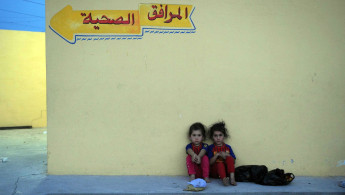Crime and punishment in Mosul
One year ago, Umm Yasir would never have believed that her home in downtown Mosul would be burgled in broad daylight. Three armed, masked men entered her house in the al-Sihha district one afternoon through her unlocked front door.
They tied up Umm Yasir and her husband, stole their money and jewellery, then escaped.
"We stayed tied up until my son arrived who made a complaint to the Islamic State group patrol," she said. "They said they would would investigate the matter but since then we haven't heard anything about our case."
Crime wave
Residents of Mosul say they have witnessed a crime wave since the IS group took control of the city in June.
Although the IS group organised a band of its fighters into police units - dishing out harsh penalties for common thieves - robberies still occur frequently.
A member of the police, speaking anonymously because he was not authorised to speak to the press, said that the reason for the spike in crimes was related to the establishment of the Islamic police unit.
"They are only present on the main streets, intersections and main districts of the city, leaving the side streets and suburbs empty of any police," he told al-Araby. "These IS people leave their positions during the evenings."
At midnight, when the electricity generators pack in and the city is blanketed by darkness, the thieves go about their work with ease.
Since blackouts hit Mosul two months ago, the city has become a ghost town at night.
"It is likely that the thieves are IS members because they operate so freely in the city. Common thieves would be too terrified about being caught and given a harsh punishment or executed," he said.
With no government office or official bodies documenting crime, it is impossible to get accurate statistics. But judging from the opinions of residents, robberies appear to be on the rise.
| It is likely that the thieves are IS members because they operate so freely in the city. - Local police source |
Lawless streets
Ashraf Mohammad, a jewellery shop worker, said that he opened up the store one day and found that both the stock and the store's furniture had been stolen.
Knowing the recent lawlessness of the city, Mohammad was prepared for something like this to happen.
"There was no jewellery in the store because I take all of it home with me at night because I fear it would be stolen. Nowhere is safe in Mosul anymore, not even our homes."
Mohammad said that almost all the shops targeted by thieves had no security guards to protect them.
"Before IS overran the city there were security guards that watched over markets and businesses in conjunction with the police. They had monthly salaries and were responsible for maintaining peace in the city and protecting local businesses."
Victimising the weak
Abu Ali runs a mobile phone shop in the al-Muthanna district of east Mosul, which was robbed one night recently.
Although robberies are frequent in the suburbs, Ali was shocked because his shop was situated in a major commercial area, which is patrolled by IS fighters day and night.
| Voices from the Caliphate: Read what life's really like in Deir al-Zour |
"The metal padlocks had been broken and more than 90 phones and the furniture was stolen," he said. "As soon as I found the shop had been robbed I went to some IS troops to report the theft but they spoke to me in a strange way and were sceptical, even though there were eyewitnesses.
"I went back home because I was scared that they would arrest me."
No rules
Activists say locals are hit both by the IS group's draconian management of the city, which is supposed to limit crime, and a lack of security.
Basic services such as electricity, water, and communication with the outside world has stopped. Access to food and medicine for ordinary citizens is increasingly difficult to find due to shortages and hyperinflation. Meanwhile, unemployment is rife.
Nineveh-based human rights activist Ali Fouad is concerned about the lack of security for residents.
"It shows the double standards of the Islamic State group, which only cares about its own interests," he said. "These are far removed from those of normal people."
Criminal gangs operate with impunity - although ordinary citizens are severely chastised when they violate the most minor of rules, facing harsh fines, corporal punishment, imprisonment in dungeons, or execution.
This article is an edited translation from our Arabic edition.



